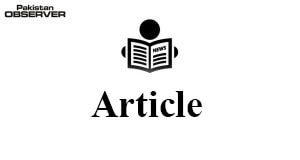A race against time
CLIMATE change poses the human kind the biggest ever threat to its existence. Global temperature is rising, glaciers melting, sea rising and islands sinking. The areas inhibited by 275 million people worldwide would be flooded if global temperature rose by 3°C.
There will be irregular pattern of weather and frequent severe weather conditions such as heat waves, heavy rains, storms, flash floods and droughts.
Agriculture crop yield will fall and the number of people suffering absolute scarcity of water will increase significantly.
Addressing the World environment day hosted by Pakistan the UN Secretary General Antonio Guterres said: “Scientists tell us these next ten years are our final chance to avert a climate catastrophe, turn back the deadly tide of pollution and end species loss”. What is climate change?
According to experts “climate change include both global warming driven by human induced emissions of greenhouse gas and the resulting large scale shifts in weather patterns”. Studies on climate change have revealed that our planet was warming at the rate of 0.7- 0.9?C per century in the beginning of last century which doubled to 1.5 -1.8°C in its last quarter.
The average global temperature is expected to rise by 2.3 °C by the end of current century. It has already risen 1?C.
The environmental scientists believe the impact of climate change on environments if not tackled timely would be “widespread, severe and irreversible”.
Realising the threat, the world countries agreed in Paris in 2015, to limit the rise in global temperature to 2°C above the pre-industrial level through mitigating efforts.
The countries pledged to reduce by half the greenhouse gas emissions, the main cause of rising temperature, by 2030 and nearly zero by 2050.
Burning fossil fuels, coal, oil and natural gas, is mainly responsible for greenhouse gas emissions.
Before reaching the Earth 30% of solar energy is dispersed in the atmosphere and the remaining 70% is partly returned to the space in the form of infrared radiation.
The greenhouse gas prevents and traps the solar radiation from escaping into the outer space which triggers climate change.
Non-disposal of wastes is another cause of degrading environments. It takes a plastic bag four hundred years to decompose. Burning wastes is not the solution. Deforestation is another cause of climate change as plants absorb carbon dioxide and release oxygen.
Pakistan has around 5 % of land under forests which is much less than the recommended 25% by the UN. The ten billion trees plantation will bring a change when completed.
Agriculture is badly exposed to climate change. Most of the developing countries are heavily dependent on agriculture and livestock. So is the case with Pakistan.
Rising temperature disrupts the growing cycle of crops, changes soil characteristics and exposes plants to diseases. As a result, productivity falls.
The rise in temperature poses threat to the survival of animals and plants as well. This is affecting ecosystem and bio-diversity.
The irony is that Pakistan’s greenhouse gas contribution to the total global emissions is less than 1% but it is one of the most vulnerable countries to climate change.
This is the case with many of the developing countries. Those more vulnerable lack the resources to handle it.
Our high population growth rate (2.4 %) is the root cause of multiple problems including climate change. Fast growing population is over stretching the country’s resources.
For instance, 21 million people have no access to clean drinking water. Pakistan is ranked ninth in the list of top ten countries with lowest access to clean water. Diseases like diarrhoea caused by water pollution results into 45% of infant deaths annually.
We have high number of patients suffering from Hepatitis C and Tuberculosis. Air pollution and water pollution are badly affecting the health of the people.
No country can handle the climate change in isolation. The world has to work in coordination to deal with the problem. The Task is huge, the time is short. It is a race against time.
—The writer is an intellectual and a carrier diplomat. His last stint was Pakistan’s Ambassador to Saudi Arabia.










